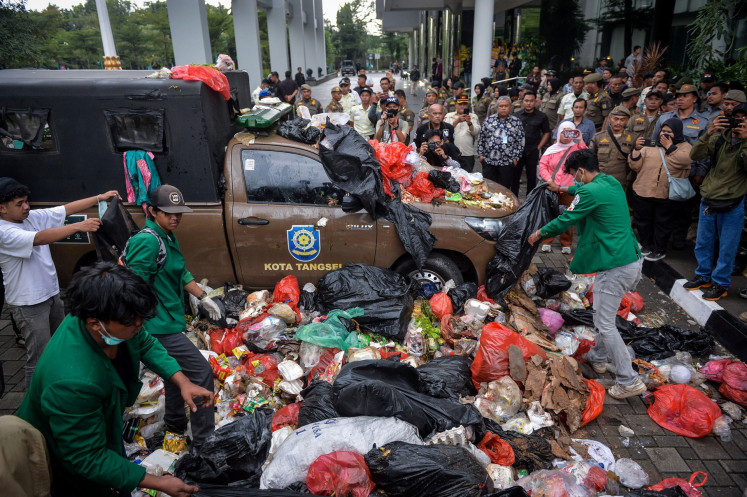Popular Reads
Top Results
Can't find what you're looking for?
View all search resultsPopular Reads
Top Results
Can't find what you're looking for?
View all search resultsPinning hopes on Danantara
Prabowo can start, for example, by limiting dividend payouts by the SOEs to the state budget so that these funds can be reinvested in the form of expansion and new ventures.
Change text size
Gift Premium Articles
to Anyone
A
n enormous overhaul is due to take place after President Prabowo Subianto establishes the Investment Authority of Indonesia (IAI) Danantara, not to be confused with the Indonesia Investment Authority (INA) already formed years earlier under his predecessor Joko “Jokowi” Widodo.
Danantara is set to become Indonesia’s long-delayed superholding that will consolidate state-owned enterprises (SOEs) under its wings.
According to the late former SOEs minister Tanri Abeng, the country should have disbanded the SOEs Ministry in 2015, as the national holding company should have been operational decades ago. Neighboring countries Singapore and Malaysia are already ahead with their Temasek Holdings and Khazanah Nasional Berhad, respectively.
The long-overdue plan has already been set in motion with Prabowo expected to greenlight Danantara to take over from the ministry seven blue-chip SOEs that together hold approximately Rp 8.9 quadrillion (US$570 billion) in assets, representing over 85 percent of all Indonesian SOE assets, according to a document seen by The Jakarta Post.
Moreover, the seven major SOEs contributed around Rp 72.8 trillion in dividends to the state budget last year, accounting for nearly 90 percent of SOE dividend payouts.
Danantara, however, is expected to also consolidate the country’s very first wealth fund INA within its ambit, extending the initial design to also include managing assets and investments on top of a mere holding company, according to the same document.
Beyond this, it is hard to tell what Danantara will actually do, as Prabowo has yet to launch the new body despite the initial plan to do so on Nov. 8, while the underlying regulations have yet to be issued. Several issues are still subject to change.
However, we urge the Prabowo administration to ensure that Danantara’s establishment will lead to improvements in the SOEs’ performances and make them more financially and commercially sustainable.
Prabowo can start, for example, by limiting dividend payouts by the SOEs to the state budget so that these funds can be reinvested in the form of expansion and new ventures.
While the government may lose a major source of revenue, it could reduce SOEs reliance on state-capital injections (PMN), which is basically taxpayers’ money channeled to ailing state-run firms or to save unviable projects.
Danantara should be provided with a clear mandate to independently make its corporate decisions and investments, free from political interference, which could come in the form of a robust legal framework.
In the past, SOEs were unable to fully live up to their potential given the flurry of government assignments that they could not refuse, with some ending up mired in debt merely to serve the ambitions of the powers-that-be.
For state-owned oil and gas firm Pertamina and state-run utility firm PLN, the government will need to separate their public service obligation (PSO) role, as it could limit their ability to maximize profits, which is essential for Danantara. This can be realized by spinning off both SOEs’ PSO roles into a dedicated separate institution to work under a ministry.
Moreover, it would be ideal if the government reconsiders merging the country’s wealth fund and Danantara, because the INA has been managing the funds of several foreign investors.
Before Danantara can play such a strategic role, it must prove it upholds the same standards and prudence the INA has preserved in order to build trust.
Lastly, operating Danantara will require revisions to the SOEs Law and Job Creation Law, which provide the legal bases for the SOEs Ministry and the wealth fund, respectively.
Without revision of the two laws, Danantara will be at risk of massive legal ramifications that will only lead to uncertainty not only for the people who will run it but also investors who will seek profits.











